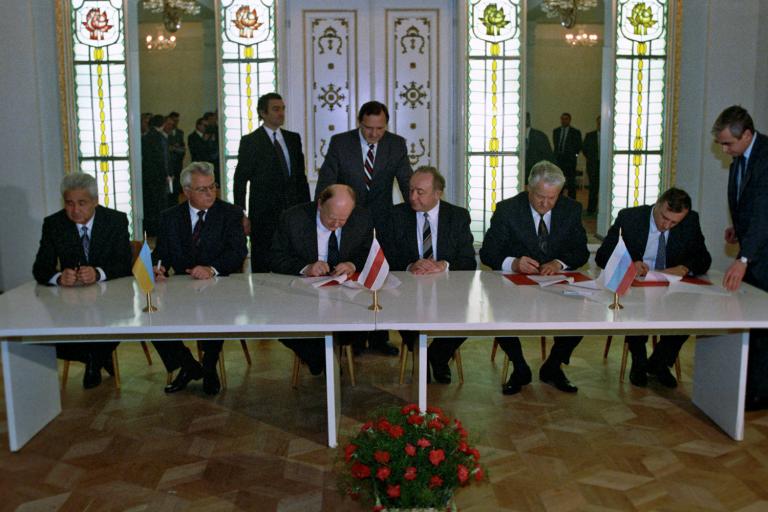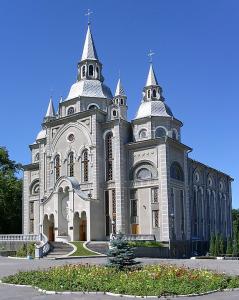What do evangelicals in the U.S. think about the Russian invasion of Ukraine? You might expect the American Christians most supportive of Donald Trump to share that former president’s oft-stated admiration for Vladimir Putin. Or given how often they watch Fox News, you might assume they’d repeat Tucker Carlson’s Kremlin-ready talking points.
But overall, American evangelicals seem to be at least as horrified as most other people around the world by the invasion of Ukraine. Perhaps more so.
For over a month now, my social media timelines have been full of evangelical friends and family adding Ukrainian flags to their profile pictures, condemning Putin, and supporting strong action against Russia. That squares with a Washington Post poll that found that white evangelicals were virtually identical to the larger American population in their response to the crisis: 80% said Russia was either unfriendly to the U.S. or our country’s “enemy”; 68% supported sanctions — six points higher than the Republican number. Those Christians might be more critical than most Americans of our Democratic president’s handling of the crisis, but they share his fundamental antipathy to the Russian invasion and the autocrat who orchestrated it.
Why? While I’m generally sympathetic to the argument that evangelicalism is now defined as much by politics and culture as theology, evangelical affinity for Ukraine likely stems from religious causes: a strong feeling of transnational Christian community forged by years of partnership in missions and ministry.
At least, that’s what I’ve found in the recent history of the evangelical Baptist denomination that sponsors my university.

“We must listen to our brothers and sisters of Eastern Europe to learn what it meant to live in a totalitarian state,” wrote Denton Lotz, general secretary of the Baptist World Alliance, after the 1991 collapse of the Soviet Union. “We must learn from them lessons of God’s faithfulness and the power of Christ’s cross to triumph.” Members of the Baptist General Conference (BGC) found that exhortation in the January/February 1993 issue of their denominational magazine, along with the lament of a former Soviet general: “Not only are our shelves empty, but our souls are empty.”
Encouraged by the thousands who made commitments to Christ during Billy Graham’s 1992 crusade in Moscow, the BGC set a post-Cold War goal of supporting fifty Russian church planters and in fall 1993 started sending its own short-term missions teams to that country. One early BGC missionary to Russia was Bethel College philosophy professor Mel Stewart, who detected “an unrivaled openness to Christianity” among the young atheists and agnostics who took classes from him at St. Petersburg State University. Stewart returned to Russia in January 1999, co-leading a Bethel travel course with political scientist and historian G. W. Carlson, who had written his dissertation on the relationship between Russian Protestants and American evangelicals in the 1960s and 1970s.
But in the end, it was in one of Russia’s neighbors where BGC missionaries found a heartier welcome and more fruitful partnerships.
By the early 21st century, Ukraine had eclipsed Russia as a regional hub for evangelicalism in the post-Soviet world. As historian Catherine Wanner told Christianity Today in 2008, Ukraine offered not only the religious curiosity that Mel Stewart detected in Russia, but a legal system and bureaucracy that proved to be “far more welcoming of the arrival of missionaries and religious leaders from elsewhere, as well as the arrival of humanitarian aid and allowing local religious organizations to distribute that aid.” (See also Wanner’s 2006 study of religion in post-Soviet Ukraine.) While only 2-4% of the historically Orthodox population is Protestant, Ukraine continues to do far better than its largest neighbors in honoring religious pluralism. Compare its 2020 U.S. State Department report on religious freedom to those for Russia and Belarus, countries where evangelical initiatives have sometimes struggled in the face of corruption and anti-evangelism laws enacted by autocratic regimes allied to Orthodox churches.
One of the first successful American evangelical missions in Ukraine came from BGC churches in my home state, which in the early Nineties began to form partnerships with small Baptist congregations in the Cherkassy region, 200 km southeast of Kyiv. “A connection between Minnesota and Ukraine would have been unimaginable before 1990,” recalled Minnesota Baptist Conference executive minister Truett Lawson, yet his 1992 trip to Cherkassy paved the way for nineteen sister church relationships within the first year of a campaign later called Love Lift.
(In his history of the Minnesota conference, Our Times & Our Stories, Lawson notes some shared history linking the two groups. Both the BGC’s immigrant founders and the Ukrainian Baptist churches trace some of their roots back to a pietistic revival that started among Swedish soldiers taken prisoner in 1709, after Peter the Great won a decisive victory over Charles XII at the Ukrainian city of Poltava.)

Joined by BGC churches in states like Ohio and Pennsylvania, Love Lift went on to organize camping ministries, musical and theatrical events, and economic development programs in Ukraine. In addition, Paul and Linda Wicklund (of Calvary Baptist Church in Roseville, MN) moved on from their initial 1992-1993 contacts to establish a separate organization, Shepherd’s Foundation, which provided medical care and equipment, then branched into ministries for children and youth. That organization itself spun off READ Ministries, which offers leadership training and resources for evangelicals in Ukraine and other former Soviet countries.
The connection between those American and Ukrainian Baptists continued after the BGC changed its name to Converge in 2008. Almost a hundred Converge congregations have formed sister church partnerships through Love Lift, and the current director of mobilization for Converge International Ministries, Tania Martin, served in Ukraine for eleven years. (Martin entered global missions through a Converge congregation in Maryland pastored by John K. Jenkins Sr., chair of the executive committee of the National Association of Evangelicals.) After the Russian invasion last month, Converge North Central regional president Mark Bjorlo retold the Love Lift story in a denominational appeal for assistance.
Likewise, Bethel, the university that Converge sponsors (and my employer), has not only educated many of the Baptists involved in Ukrainian missions but forged its own connections to that country. “When I worship I can close my eyes and put myself back in Ukraine,” said one Bethel senior and short-term missionary in 1995. “I think that’s the Holy Spirit connecting us.” Around the same time, Dennis Port’s own experiences in Ukraine led the Bethel music professor to form Evangelion, a professional choir that toured the country several times — singing in some of the same cities now appearing on the nightly news as sites of war. One of my current history students has family in Ukraine, and for several years our faculty included Ruslana Westerlund, a Ukrainian immigrant who had served as an interpreter for the early Minnesota Baptist missionaries. “With Bethel University’s strong ties to Ukraine,” tweeted Bethel president Ross Allen, in sharing a TV interview I did about the early days of the war, “we are praying for their people during this heart-wrenching time.”
In asking for help from Converge members, Bjorlo mostly steered clear of politics, not mentioning Putin and affirming both Ukrainian and Russian “brothers and sisters who long to see their communities and their nations meet, know and follow Jesus.” But after a generation of American evangelicals have prayed for Ukraine, given money to Ukraine, traveled to Ukraine, taught and sung there, and befriended its people, it’s no surprise that he called Ukrainians “the brightest light of the gospel of Jesus Christ in Europe.”
If you want “to help them hold that light high regardless of the circumstances, as some stay within the borders of Ukraine and others seek refuge in neighboring nations,” click here to support the Converge relief fund.
Both Shepherd’s Foundation and READ Ministries have also set up relief funds.













